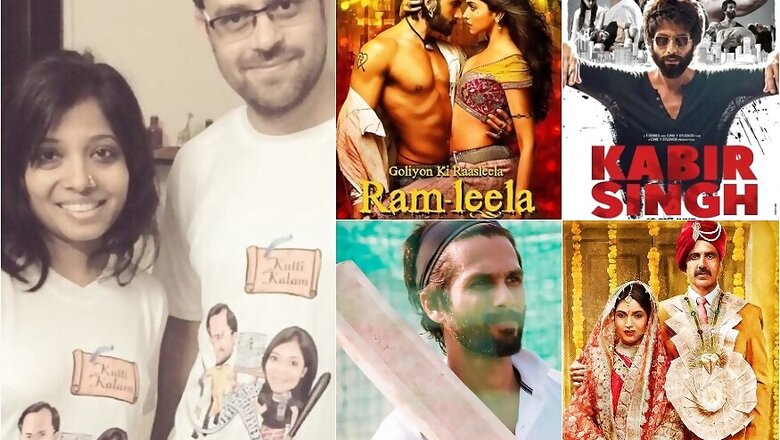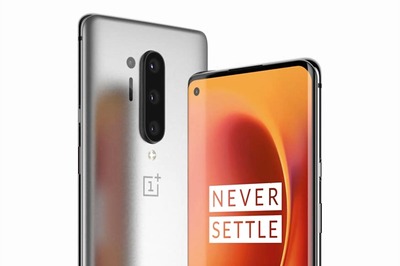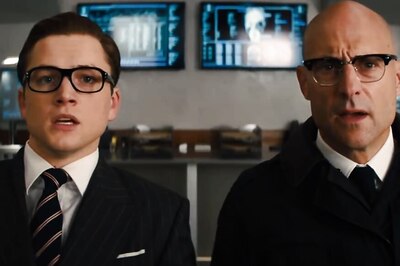
views
Writer duo Siddharth-Garima, whose credits include films such as Ram-Leela and Toilet: Ek Prem Katha, has opened up about the power dynamics inside the Hindi film industry as they struggle to navigate through it even after working in the showbiz for nearly eight years.
Siddharth and Garima, who recently launched their YouTube channel Fasterclass, spoke at length about how writers are mistreated and taken advantage of in the film industry.
Excerpts from the interview:
How did you come up with the idea of starting your YouTube channel?
It’s a lockdown baby. We feel, while no one can actually ‘make’ you a writer, yet there are ways in which you can hone the talent. Fasterclass is an initiative to tell all aspiring writing talent about how to go about their journey from being writers to become screenwriters.
We have witnessed so many remakes, sequels, and films inspired by true events in recent times. Will there be a focus on encouraging these budding writers to write original content?
We strongly stand by original content and creation. We are willing to fight as many battles and cross hurdles to mount original stories. While our filmography is a mix of some remake-dialogues and some original stories, we feel for every remake that we write, if we get to make even one original screenplay film, it's worth the effort (so, of the 6 that we have done so far 4 are our very own original scripts).
We feel remakes come from a place where the producers feel safe when there’s a reference point to any new idea. Meaning there’s a ‘source of inspiration’. Though there are enough and more producers now who are willing to back original content and there are writers/creators who believe in originality. Fasterclass comes from a place where we only talk about creating from a scratch in every capsule that we design. The industry can certainly do with many more original content creators.
Writers and lyricists are increasingly raising voice against the alleged mistreatment toward them in the film industry. Of late, there have been several instances of such confrontations between writers and film-makers. Your comment.
The thing is that the writer is the first person to be hired on a film. They are the ones who make it a film from a blank page. As a process, we both believe in being there for our scripts right from the germination to the shoots to the post-production (or until when a film releases). We feel when a director is not the writer himself/herself, the writers ought to be there at every step of the process – otherwise, there’s a loss in translation and it reflects on the project. Sadly, in many instances, once the script is done and the cast is in place, the writer’s job is pretty much done and they become redundant for the producers/director. Then they begin to forget the value that a writer brings to the project and they subconsciously begin to do away with their credits or inputs. It’s a lot like the treatment meted out to the surrogate mothers in this country (hence our debut film as directors!) paisa lo, service do aur gayab ho jaao! A writer is a closed-door hero, who wins applause in a room full of people but is never sung about loud to the rest of the world.
But things are changing thanks to OTT. In the web shows, the writer is the showrunner. You can fire a director and bring on a new one but you can’t fire a writer or dishonor his credits. Soon the film industry shall follow suit.
You guys also wrote the dialogues for Kabir Singh, which became one of the biggest blockbusters of 2019. But the film also received criticism for being "problematic" and "misogynistic." Did any of those reactions make you guys reflect that why the movie made a sizeable number of people uncomfortable?
In the view of many, Kabir Singh was a sexist, and a misogynist character. What appealed to both of us when we first saw the film was the love story between the two, which remains pure right till the end. It’s a fiery, feisty love affair between a flawed character and a girl he loves with utmost sincerity. That love remains true till the end, with a million wrongs that he does along the way. There are characters like that and we understood the place the director was coming from. We feel the film never really glorified misogyny, it just brought the discussion out in the open. What people (who judge easily) fail to understand is that it’s the story of a character like that. Neither does the director become a misogynist or the actor who played it is a symbol of toxic masculinity nor do the writers patronise anything like that. By that logic, Mr. JP Dutta should have been a brigadier now! Films are just a reflection of the society, and Kabir is a case-in-example for a modern-day love story in a highly inflammable self-destructive situation.
Both of us feel that Preeti’s strength of character was in her silence, she was unlike these firebrand female characters we see in the films now, who are expected to behave in a certain way because the ‘feminist norms’ confirm to it. Why does a girl ‘choose to not slap’ a man who gives her undue attention? She would never give in to his advances if she felt violated! If Preeti could reply to the cynics, we’re sure she would say – ‘main uski bandi hun’ you got a problem with that? That ownership in love is sadly mistaken to be submission or weakness. If she was a weak character, she would run to him in the first instance when she discovered that she was pregnant with his child. We don’t need to fix the content we make, we need to fix the society we live in. Content or the reactions to it is the reflection of the pre-conditioned mindsets.
Did the criticism around Kabir Singh make you guys conscious at all, in terms of collaborating on future scripts for dialogues?
Kabir was not our screenplay. We tend to get attracted towards creating very strong and powerful female characters in our stories, from the fiery Leela (Raam-Leela) to a feisty Jaya (Toilet: Ek Prem Katha) and to the never-before Jasmine (Upcoming Dukaan). We feel feminism is a word for the weak. Women need no empowerment. Their strength just needs to reflect on the screen.
There's been a constant debate going on about nepotism, lobby culture, and favouritism in the Hindi film industry. Has the power dynamics in the industry ever hurt you in your respective careers?
Favouritism does hurt. People have announced films on subjects which they knew belonged to us. The mighty and the powerful then create lobbies to prevent us from mounting/casting our films. The reasons are different – sometimes it’s the first-mover advantage or maybe just more faith in their favourites. In spite of having no godfathers/ camps, we believed in the merit of our work and didn’t think it would be a challenge to mount our directorial projects. Since we have worked with most of the film production houses in the last seven years, on various scripts, we had concluded that good writing will find its takers, no matter what. But when we decided to direct a few of our original scripts, we saw a whole new side to the industry – right from buying into the idea, the script to casting a project, nothing is based on merit. It’s the people we hang out with, that matters the most. Having said that, after a few setbacks, we have managed to find the right people both in terms of the producers and the cast to make these films. We are in the process of mounting them and are thrilled to be going on floors soon.
Lastly, you guys have also penned dialogues for Jersey. Tell us something about that. Is there pressure to live up to the expectations of the original?
Jersey is an emotional comeback story of grit and perseverance and we feel it would find a huge connect with the audience. The south industry encourages original talent a lot much more compared to Bollywood and hence their writer-directors flourish. Such stories deserve a larger canvas and we are all for supporting such content. The pressure and the challenge in a remake is the maximum on a dialogue writer because that’s what would connect to people or differentiate it from its dubbed versions. Thankfully, we could crack a whole new world for this film and define a tone that not only does justice to the original track but also entertains/appeals in its own unique way. We have also added a tinge of our humour here and there to make it even more relatable. Shahid and Mrunal have beautifully taken on to their characters and we are all happy with how it's shaping up.

















Comments
0 comment